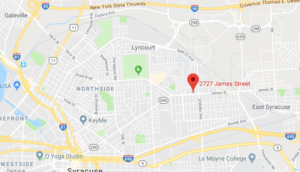On Monday, October 23, 2017, the Sky Armory in downtown Syracuse will transform into a venue filled with diverse cultures from around the world. The Welcoming Economies Convention takes place over three days, where people from around the globe convene to discuss topics ranging from politics to programs, and highlight notable people in the field who are paving the way for future generations to follow. From 6:00-8:00 in the evening, conference attendees will be able to experience something Syracuse has become increasingly known for, diversity. Guests will be treated to performances from multiple refugee populations within the city, as well as food prepared by refugees, highlighting the countries they were forced to flee from. This article focuses on one specific chef, Assad Almajid.
Assad was born in Damascus, the capital of Syria. He began working in his father’s shop when he was nine years old, learning about sweets and ice cream. He would spend every day after school working with the ice cream, and every morning until midnight on the weekends. He loved working with his father, but dreamed of starting his own business one day. If he stayed in Damascus, he would only be able to make $500 a month, which would not be a sufficient living salary. So, Assad chose to get his Master’s Degree in business administration. He then moved to Dubai for 9 years to work as an accountant.
“Dubai is a city of money. I decided to go there, work a couple of years, make some money, and come back and start my own business. I’m the type of person that doesn’t want to get help starting my own business.” – Assad Almajid
That persistence paid off. When he returned to Damascus, he opened his own chocolate factory. It became extremely successful. Most of his sales were from exports, where he sold a majority of his chocolate to other countries in the Middle East. Everything was going well, until the war broke out.
“What began as a peaceful uprising against Syria’s President Bashar al-Assad [in 2011] became a full-scale civil war that has left more than 300,000 people dead, devastated the country and drawn in global powers.” – BBC
The Syrian War initially began as an attempt to overthrow President Bashar al-Assad after the government used deadly force to halt protesters who opposed him. Violence escalated, and it became a civil war. The war has lasted so long because other countries have involved themselves in Syria’s war. The United States, Russia, Saudi Arabia, and others have taken sides in the war, adding military, financial and political support to the fight. Many countries have interests in controlling Syria because of its location in the Middle East. Russia has been backing President Assad, while the United States is backing opposition forces.
The United Nations reported that over five million people have fled Syria since the war began. This has left neighboring countries, such as Lebanon and Jordan, struggling to manage the influx of refugees to their population. Assad Almajid and his family were a few of the refugees who made the choice to leave their home in hopes of finding safety. Shortly after the war broke out, Assad’s flourishing chocolate factory was destroyed by the bombings. His family made the decision to leave Syria, and fled to Jordan. Assad was unable to work in Jordan legally unless he did labor, so he could not restart his chocolate factory in this country. After three and a half years in Jordan, his family was accepted to the United States as refugees.
Over ten thousand refugees have come to Syracuse since 2000, which is a significant portion of the population.
“Onondaga County accepts refugees at the highest per-capita rate in the state and the third highest rate in the nation.” – Syracuse.com
While opinions about refugees entering the city are mixed, one man saw an opportunity to highlight the diversity within the city and bring the community together around something everyone loves, food. Adam Sudmann and My Lucky Tummy have given many refugees in Syracuse the opportunity to showcase their talents and share their culture with the community. Adam moved to Syracuse from New York City, and immediately became interested in the culture and diversity of Syracuse. Within a few months, in May 2013, he hosted his first My Lucky Tummy. Food was made from Bhutan, Burma, Eritrea, Iraq, Poland, and Cuba. Now, four years later, he will host his fifteenth event, and Assad will provide dessert.
In June of 2016, Assad, his wife, three daughters, and son arrived in Syracuse. While he was not able to choose where in the United States he moved, he said he studied the area, the people, the weather, and the buildings, and felt Syracuse would be the right place for his family. He plans to stay in Syracuse for the long-term, and has purchased property to start his dream of owning a business again.

2727 James Street, near the Key Bank, is now owned by Assad. Instead of a chocolate factory, Assad will make sweets and barbeque, similar to his father’s business Assad grew up surrounded with. He is looking forward to finally open his shop, known as Sinbad’s Sweets and Ice Cream, but knows that it may take some time before it is ready to go. Everything is ready, his supplies, the refrigerator (on its way from Turkey), and his employees. However, permits take a long time to approve before the work can be done to legally open the shop. It’s also difficult to market and find ways to promote his product.
“People prefer what they know. They don’t know my product. I need to teach people my product.” – Assad Almajid
In order to reach Syracuse, he has taken any chance he can get to share his product with others. Welcoming Economies in Syracuse will be another opportunity he has to showcase his talents. Guests will be treated to Assad’s Syrian ice cream, made by hand. Assad will make ice cream for three hundred people.

Guests can expect to taste a bit of a crunch, since his ice cream machine and hammer are still on the way to Syracuse, so it will not be as smooth as it typically would be. While the base ingredients are similar to most ice cream, including milk, heavy cream, and sugar, there is also mastic gum, also called Arabic gum, sahlab, rosewater, and pistachios, making it extremely flavorful. Its nuttiness, combined with a subtle floral aroma, will make it a taste many guests have not yet experienced, but will look forward to tasting again in the future.